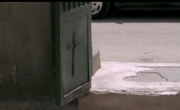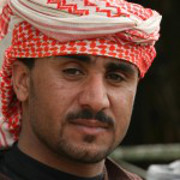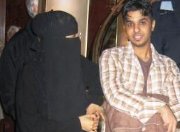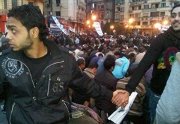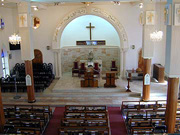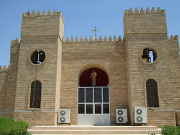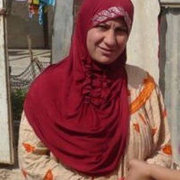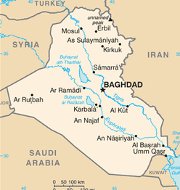By Michael IrelandSenior International Correspondent, ASSIST News Service
BAGHDAD, IRAQ (ANS) -- Following the withdrawal of US forces from Iraq, the Christian minority faces continued sectarian violence, political mayhem, unemployment, lack of security, failing health care and the inability to buy food.
 |
Canon Andrew White,
the ‘Vicar of Baghdad' |
According to the popular cleric, Canon Andrew White, the ‘Vicar of Baghdad’ who serves St. George’s Church in Baghdad, conditions have grown worse for the Christian community since the American departure. Among the exclamations of the Christians in Iraq is the statement: “We Have Been Left and We Have Nothing!”
Canon White told ANS in a recent update: “None of us thought there would be any change here after the US troops left. They had not been seen on the streets for two years. We were totally wrong: from the day that the US military left we were in total chaos and disarray.
“Violence increased, religious sectarianism increased again in force. We could not even enter the Green Zone, as any badges issued by the US were no longer valid; the new badges were simply not being issued. Total mayhem politically began with the prime minister issuing a warrant for the arrest of the Vice President Tariq Al Hashami. He was accused of terrorism, and sadly there was a lot of evidence to suggest this was true.”
White said that with this action, great significance was placed on the fact that the Prime Minister Nouri Al Maliki was Shia and the Vice President was the most senior Sunni political figure in the country. “Terrible sectarian violence targeting the Shia has begun,” White said.
White continued: “There were also coordinated attacks on the institutions of the state, including on the Foreign Ministry, which is very close to St. George’s Church. With the arrest warrant for the Sunni Vice President issued by the Shia Prime Minister, the fragile coalition government is fracturing down sectarian lines and turning violently on itself.
“What I most feared would happen, is happening. I said all along that it wouldn’t make any difference to us if the Americans leave. I was really wrong,” said White.
White stated: “It is becoming really difficult in Iraq right now. Before, we knew that the US were just around the corner, so we could get them if we needed them, but now they are not there. But we won’t give up, we won’t stop our work, and by God’s grace we will keep going.”
Canon White said events in Iraq have escalated in recent days, as the departure of the US troops appears to have sparked a series of attacks and disputes within the divided country.
Just one week ago, US President Barack Obama declared: “We are leaving behind a sovereign, stable and self-reliant Iraq, with a representative government elected by its people."
White says the reality is “swiftly proving to contradict the President’s words.”
Canon white said there have been attempts to ransack both al Hashami’s office and that of al Maliki in recent days.
“There has even been a car bomb in the supposedly secure Green Zone. The attacks form part of wider and increasing sectarian violence in Iraqi society,” he said.
He continued: “Even as the US troops left Iraq, the fear of the Christians and other minorities has increased. They say, ‘At least before, under the old regime we were protected; now we have nothing. Those who have set us free from an evil dictator have now left us and we have nothing.’”
White asks: “What is this ‘nothing’? It is no security (where) before the Christians, as minorities, were protected. The evil regime of Saddam (Hussein) was led by man who was not the Shia majority but a Sunni from the second group not the first. When the foreign troops were here, even though we often did not see them, they were not far away and if and when we needed them they were there.
“There are times when we ourselves face great danger. Our people have been slaughtered, massacred and murdered, but now we have nobody to turn to. There has been much talk about the security needs of our people. The Iraqi Government has tried to do what it can, but we do not live in a ghetto. The Christians are based all over Iraq, but especially in Baghdad and Nineveh/Mosul. 2,700 years after Jonah, Nineveh is still the place where all Christians come from. So the Christians and all minorities are less safe than they have ever been,” Canon White said.
“ ‘Nothing’ is far more than security though. Employment is far more limited, not least for women. The main industry is now security, and for the Christians -- educated women -- things are more difficult than ever in an increasingly orthodox Islamic state. A state where the rights of women have sadly diminished,” he said.
“No employment means no money, and that means no ability to buy food, pay rent for housing, or even possess proper health care. The health care system here in Iraq has seriously collapsed. The hospitals are falling to pieces and many of its leading doctors have been killed, kidnapped or have fled from Iraq.”
Canon White said that although he may be the leader of a church, “but after services each week I also have to give all my 4,000 plus people food for the week.
“We have had to establish a large clinic with doctors, dentists, laboratory, and specialist units and also a pharmacy. All treatment is totally free -- and it is not just restricted to Christians either, but is totally open to all and is totally free of charge. In addition to these services we also have also built a school to provide excellent education to our many children. It is fortunate that we can provide this service for our people, but we did not envisage that this long after 2003 we would still have to, but we do.
“Iraq today is still an insecure place where most of the people have nothing.”
White added: “Things are difficult for all Iraqis, but for us as minorities, it is particularly so. The violence here is known about and is terrible and much of it has come from outside, but now we have another huge problem. It is such a big issue that three years ago we became the top nation in the world in this crime; it is nothing less than corruption. Corruption that is so great that we no longer know whom we can even trust.”
Canon White explained that when the Coalition Provisional Authority took control of the nation in 2003, he remembers telling one of the diplomatic leaders that “we needed to deal with the issue of religion in order to prevent religious sectarian violence.
“I was told that this was not really an issue in Iraq. First, I was told that water and electricity needed to be dealt with. It was only a few weeks later that this diplomat came to me and said that he could not even deal with water and electricity because religion kept getting in the way.”
Canon White went on to say that it was William Temple, the Archbishop of Canterbury in the Second World War, who said, “When religion goes wrong it goes very wrong.”
“Sadly, that is what has happened here. Religion here now is not seen as a tranquil means of relating to the Almighty, but a means of fighting for the rights of their own. A fight that sadly often involves violence. The fight that recently arose from Sunni to Shia was just a further symptom of this sectarian violence. If religion is the cause of the violence, it must also be the cure. That is the work of the High Council of Religious Leaders in Iraq that we established in 2004,” he said.
“Many were killed and injured,” said White. “We, as religious, began an urgent process to try reducing the sectarian violence. We met in Najaf, the Holiest City in the world to the Shia. For the first time ever we took some of the Sunni religious leaders to Najaf, we heard first hand from the Shia religious leaders of their immense fear of the renewed sectarian violence. A few days later we met with a large number of Sunni leaders in Baghdad. Together we produced an Islamic Fatwa (injunction) against the Sunni attacking and killing the Shia. Much of diplomatic world still fails to see that this problem of ‘Religion gone very Wrong’ has to be dealt with by religion itself. That is why we are here and what we try and do.”
Canon White concluded: “Sadly, this radical sectarianism is no longer just restricted to Iraq -- the so called Arab Spring has greatly increased this risk of this sectarianism in the whole of the region. Will there now be a lot more minorities in the region saying, ‘We have nothing?’
“I have just come from our prayer meeting and I told people about today’s update and they said, "Everybody may have left us, but Yeshua (Jesus) has not!"
| ** Michael Ireland is the Senior International Correspondent for ANS. He is an international British freelance journalist who was formerly a reporter with a London (United Kingdom) newspaper and has been a frequent contributor to UCB UK, a British Christian radio station. While in the UK, Michael traveled to Canada and the United States, Albania,Yugoslavia, Holland, Germany,and Czechoslovakia. He has reported for ANS from Jamaica, Mexico, Nicaragua, Israel, Jordan, China,and Russia. Michael's volunteer involvement with ASSIST News Service is a sponsored ministry department -- 'Michael Ireland Media Missionary' (MIMM) -- of A.C.T. International of P.O.Box 1649, Brentwood, TN 37024-1649, at: Artists in Christian Testimony (A.C.T.) International where you can make a donation online under 'Donate' tab, then look for 'Michael Ireland Media Missionary' under 'Donation Category' to support his stated mission of 'Truth Through Christian Journalism.' Michael is a member in good standing of the National Writers Union, Society of Professional Journalists, Religion Newswriters Association, Evangelical Press Association and International Press Association. If you have a news or feature story idea for Michael, please contact him at: ANS Senior International Reporter |  |
** You may republish this story with proper attribution.

%2009-27-13.jpg)
